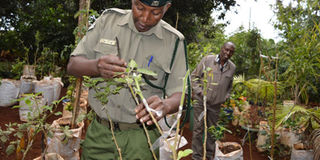Pomato offers you two harvests in one

Samuel Manene tendering a grafted plant of Sodom apple and tomato . PHOTO | ERIC WAINAINA | NATION MEDIA GROUP
What you need to know:
- To come up with the pomato, explains Manene, one dissects the stem of the potato plant two inches from the bud and inserts the wedge-shaped flowering tomato scion into the dissection before tying it up with a polythene strip.
- The Sodom Apple, according to him, is to make tomatoes disease-resistant and use little water because they have deep roots.
His prisons uniform comprising of a jungle green trouser, a matching short-sleeved shirt, black boots and a green cap make him appear anything else but a researcher.
But Sergeant Samuel Manene knows too well that looks can be deceiving. However, he prefers to be recognised always as a prison officer, as that is his first love.
Manene is a crops researcher and he is the brains behind the pomato plant, which was grafted from potato and tomato.
Seeds of Gold meets him at Kiambu GK Prison, where he works as a warder. In his right hand was his tool of trade, a gun, but the machine did not stop him from tending to the pomatoes he is growing at the facility.
“My duty in prison is to rehabilitate criminals through agriculture. I came up with pomato to help me do the task,” says Manene.
Many prisoners would leave jail, he explains, and return after a few months after committing crime because they could not raise capital to engage in farming. “Pomato was to help them find it easier to engage in agribusiness after jail by growing potatoes and tomatoes on one stem.”
Manene grafted the plant, which requires minimal capital and land to grow in 2010.
TO COME UP WITH POMATO
To come up with the pomato, explains Manene, one dissects the stem of the potato plant two inches from the bud and inserts the wedge-shaped flowering tomato scion into the dissection before tying it up with a polythene strip.
The dissection is done high above the soil to prevent bacteria and disease-causing organisms from infecting the plant. After grafting, the tomato leaves continue making food for the potato tubers beneath the soil.
The officer, who hails from Meru, never thought the innovation would blossom to get adoption even by science and agricultural research institutions.
To ensure the product was fit for human consumption, Manene, who by then had a diploma in crop protection from University of Nairobi, took it for analysis in 2011 at Kenya Agricultural Research Institute (Kari) and it got approval.
The officer says he involved Kenya Agricultural Research Institute when the experiment was successful because he did not want to inform them of something that may not work.
Manene has also worked on Somato, which he grafted from Sodom Apple, a wild plant that is disease-resistant, and tomato plant.
“With grafting you can easily make any crop from others. Somato is easier to grow. You find plastic bags, then collect Sodom Apple plants, they mainly grow in the forest, get bad tomatoes and grow them to get seedlings for grafting.
The plant requires no chemicals and you use little water,” Manene tells Seeds of Gold, adding that they are healthy for human consumption.
SODOM APPLE
The Sodom Apple, according to him, is to make tomatoes disease-resistant and use little water because they have deep roots.
His grafting projects have won him numerous awards during Agricultural Society of Kenya shows, among others.
The crops are now grown by farmers across different parts of the country. Manene, who is the farm manager at Kiambu GK Prison, has also worked on low altitude apples and pears, which he brought from Ghana and grafted with local olive trees.
Another of his crops is Kiambu One, which is a cross-pollination of yellow and purple apple varieties. He is yet to give it a commercial name.
The officer currently is doing a degree in horticulture at Jomo Kenyatta University of Agriculture and Technology, where he is a second year student and his fees is being catered for by the prisons department.
The department has given him a three-year study leave to pursue his education until he attains PhD.
Manene says innovators should pass their knowledge to other people to make it useful to the society. “You are not known by what you own but by how much have you done to improve the lives of others,” says the 46-year-old, whose love for science and agriculture started when he was in Form Two, where he represented his school at the Science Congress to the provincial level in Eastern.
The officer has registered the company Central Green Field Nursery, through which he produces pomato seedlings that are grown by farmers in Isiolo, Githunguri, Meru, Nairobi, Sagana, Kitusuru and Kitengela.
Joseph Mureithi, the principal of Waruhiu Agricultural Training Centre in Kiambu County, says the institution works with Manene in spreading pomato and others like somato.
“To many people, a product of Sodom Apple (a bitter wild plant) and tomato as well as other crops done by Manene could be poisonous, but that is not the case. Sodom Apple only helps to make the plant disease-resistance,” he says.





